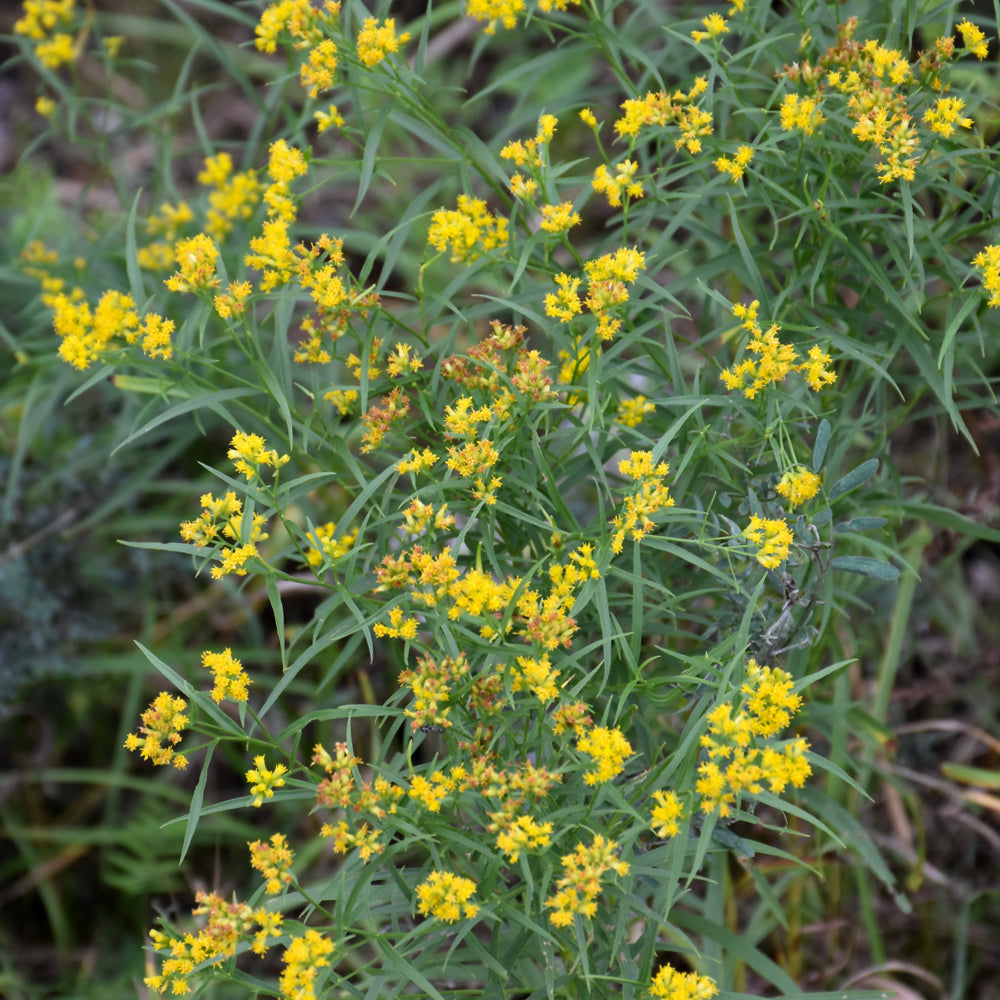Grass-leaved Goldenrod
Grass-leaved Goldenrod
|
|
Browse More Plants |
Shipping for other products is calculated at checkout.
Couldn't load pickup availability
Botanic Name: Euthamia graminifolia
Description: This native species presents flat topped clusters of golden yellow blooms from late summer, on branched, bushy plants; will aggressively colonize wet to moist areas by rhizomes and self-seeding, so soil containment and deadheading are advised
Landscaping Attributes
Landscaping Attributes
Grass-leaved Goldenrod is an herbaceous perennial with an upright spreading habit of growth. Its relatively fine texture sets it apart from other garden plants with less refined foliage.
This plant will require occasional maintenance and upkeep, and is best cleaned up in early spring before it resumes active growth for the season. It is a good choice for attracting bees and butterflies to your yard, but is not particularly attractive to deer who tend to leave it alone in favor of tastier treats. Gardeners should be aware of the following characteristic(s) that may warrant special consideration;
Spreading, Insects, Self-Seeding
Grass-leaved Goldenrod is recommended for the following landscape applications;
Mass Planting, General Garden Use, Naturalizing And Woodland Gardens, Container Planting, Bog Gardens
Ornamental Features
Ornamental Features
Grass-leaved Goldenrod has masses of beautiful clusters of lightly-scented yellow flowers with gold overtones at the ends of the stems from late summer to early fall, which are most effective when planted in groupings. Its grassy leaves remain grayish green in color with hints of steel blue throughout the season.
Planting & Growing Tips
Planting & Growing Tips
Grass-leaved Goldenrod will grow to be about 3 feet tall at maturity, with a spread of 24 inches. When grown in masses or used as a bedding plant, individual plants should be spaced approximately 18 inches apart. It grows at a fast rate, and under ideal conditions can be expected to live for approximately 10 years. As an herbaceous perennial, this plant will usually die back to the crown each winter, and will regrow from the base each spring. Be careful not to disturb the crown in late winter when it may not be readily seen!
This plant does best in full sun to partial shade. It is quite adaptable, prefering to grow in average to wet conditions, and will even tolerate some standing water. It is not particular as to soil pH, but grows best in rich soils. It is highly tolerant of urban pollution and will even thrive in inner city environments. This species is native to parts of North America. It can be propagated by division.
Grass-leaved Goldenrod is a fine choice for the garden, but it is also a good selection for planting in outdoor pots and containers. With its upright habit of growth, it is best suited for use as a 'thriller' in the 'spiller-thriller-filler' container combination; plant it near the center of the pot, surrounded by smaller plants and those that spill over the edges. It is even sizeable enough that it can be grown alone in a suitable container. Note that when growing plants in outdoor containers and baskets, they may require more frequent waterings than they would in the yard or garden.
More Info...
More Info...
Hardiness Zone: 2
Sunlight: Full Sun To Partial Shade
Height: 4 feet
Spread: 24 inches
Photo Credits: NetPS Plant Finder
Share


